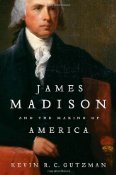
James Madison and The Making of America by Kevin R. C. Gutzman
 James Madison and The Making of America is not really a biography. It is exactly what its title suggests, the story of the making of America, or at least its government. Kevin R. C. Gutzman’s book takes the reader on a chronological journey of Madison’s involvement in that process. It mirrors some aspects of Labunski’s James Madison and The Struggle For The Bill of Rights, but is broader in scope and less biographical than that excellent book.
James Madison and The Making of America is not really a biography. It is exactly what its title suggests, the story of the making of America, or at least its government. Kevin R. C. Gutzman’s book takes the reader on a chronological journey of Madison’s involvement in that process. It mirrors some aspects of Labunski’s James Madison and The Struggle For The Bill of Rights, but is broader in scope and less biographical than that excellent book.
In this book, there is very little detail pertaining to Madison himself. In this respect the book is almost dispassionate in its tone. Where in Labunski’s book, the reader gets a sense of Madison’s reluctance to travel and his struggles with his health as well as his contributions to the Constitution, in Gutzman’s book, when Madison was ill during the Virginia convention, it is only mentioned to explain his absence in the chronology of events. Gutzman’s book doesn’t waste time on the human aspects of its subject.
However, Gutzman makes up for this somewhat flat characterization of Madison by delving deeply into his political philosophy and principles. He takes the reader through an exhaustive account of the Constitutional Convention and Madison’s contributions. He provides a day-by-day account of the issues, arguments, and their resolution. (None of the other players on this stage survive with a personality either.)
Gutzman relieves the tedium of his account by offering an occasional sardonic remark in his telling of events. For instance, in recounting the arguments surrounding how representation was to be apportioned under the new government, Gutzman slips in this dry remark,
Gouverneur Morris of Pennsylvania followed Madison with an appeal to consider the effect of the committee’s proposal upon the entire world. He lamented that some delegates seemed to think of themselves as representing only their particular states, when really all humanity had a stake in the conventions outcome. Like Madison’s, Morris’s disinterested principles led him to a conclusion that favored his large state’s interests.
After concluding his coverage of the Constitutional Convention, Gutzman moves on to Madison’s contributions to the Federalist Papers. This section of the book was the most interesting to this reviewer. (At the time of this writing, WWTFT has put about 36 of these essays into modern English, and spent the requisite time to understand them enough to do so.) Gutzman goes through each of the Madison-authored Federalists with varying degrees of detail. Initially, he talks a little bit about the evident collaboration between Madison and Hamilton, but it would have been interesting had he devoted a bit more to this. Nonetheless, this section of the book is one that this reviewer will undoubtedly refer to in the course of his own studies of the Federalist.
Gutzman also covers Madison’s participation in the Virginia ratifying convention and his tireless efforts to get the Constitution ratified by a majority of the States. Following the successful ratification, Gutzman covers some of the ground in Labunski’s book with regard to Madison’s efforts to get the Bill of Rights passed.
The remainder of the book is about Madison’s service in Congress, as Jefferson’s right hand as Secretary of State, his presidency, and finally his long career as a political sage after retirement. In reading this book, like so many others about the Founders, the reader is struck with the magnitude of their contributions and intellects. No, these men weren’t perfect, but they deserve our admiration and our gratitude. Consider some of Madison’s accomplishments:
- Driving force behind the Constitutional Convention and getting Washington on board
- Attending Physician at the birth of the Constitution (some say father of the Constitution)
- Chronicler of the Convention – Madison provided a treasure trove of meticulous notes on the Convention which were published after his death.
- Collaborator on the Federalist Papers, authoring 26 of them
- Participant in the Virginia ratification convention
- As a member of the House of Representatives, Madison crafted the amendments that would comprise the Bill of Rights and sent them to the states for ratification
- Secretary of State under Jefferson
- President of the United States (two terms)
- Author of numerous essays and treatises – even after retirement from public office
This is, by no means, an exhaustive list, but represents the majority of the themes in James Madison and The Making of America. Gutzman’s book filled in some gaps in this reader’s knowledge and provided a number of pointers to subjects for further investigation.
 The posts are coming!
The posts are coming!

0 comments
Kick things off by filling out the form below.
Leave a Comment